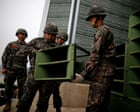
Recent developments on the global stage indicate a series of deliberate and thoughtful actions aimed at reducing tensions and fostering dialogue among nations. With attention focused on these positive gestures, a glimpse of hope emerges for easing long-standing disputes.
In a notable move, South Korea has commenced the dismantling of loudspeakers along its border with North Korea, signifying a clear gesture of peace. These loudspeakers, once echoing propaganda daily, are being removed as a part of South Korea’s effort to mend relations with its neighbor. President Lee Jae Myung’s administration sees this as a tangible step toward de-escalation without compromising military preparedness. This initiative reflects Seoul’s broader strategy to revive talks with Pyongyang, which had previously faltered. By quieting the rhetoric, there is a mindful acknowledgment of the power of silence in calming tensions and creating space for constructive engagement.
Simultaneously, diplomatic movements are happening across continents. The United States’ special envoy, Steve Witkoff, is expected to visit Moscow imminently. With a deadline approaching, set by US President Donald Trump, Witkoff’s visit underscores the urgency of a proposed ceasefire, which aims to settle the ongoing conflict involving Russia. This diplomatic effort highlights the continuous negotiations and the expectation of mutual understanding to prevent further conflict and potential sanctions. Such dialogues reiterate the commitment of international stakeholders to achieving peaceful resolutions through patient and consistent dialogue.
Elsewhere, in a call to global attention, Israel is highlighting the plight of hostages in Gaza. Of the 251 individuals taken during a past incident, 49 remain in captivity. This focus is not merely an appeal for justice but a strategic insertion of humanitarian issues into the international agenda, ensuring they are viewed as a priority in diplomatic conversations. There is an earnest endeavor to make human welfare a central concern in international discourse.
Meanwhile, the complex dynamics in the Middle East prompt discussions about the potential implications of recognizing Palestine as a state. Portugal’s recent acknowledgment has sparked reactionary measures from Hamas, demonstrating the tightrope of diplomatic choices in the region. The decision underscores the nuanced balance required in international relations, where recognition can simultaneously hold promise and challenge. As these debates unfold, they highlight the intricate interplay of actions and reactions that define the peace process in volatile regions. Decision-makers are placed in positions where every gesture must be made with careful contemplation of potential repercussions.
Each of these instances represents a broader trend of engaging in peaceful dialogue and understanding among nations. They are a reminder of the interconnectedness of global policies and the impact of diplomacy on local and international scales. While challenges remain, these actions collectively offer a piece of serenity—a reminder of the ongoing human endeavor to find harmony amidst a complex and ever-changing world.
Source: {link}
